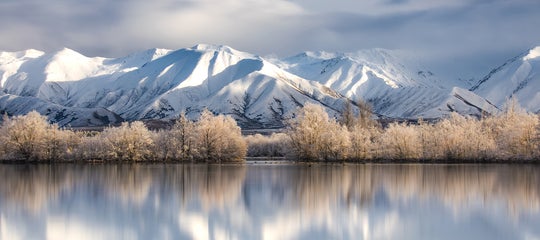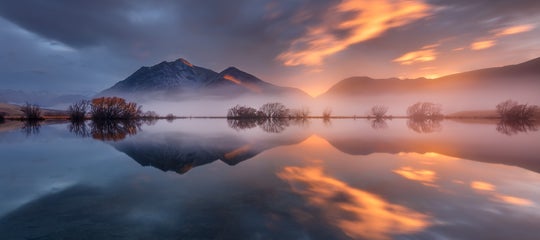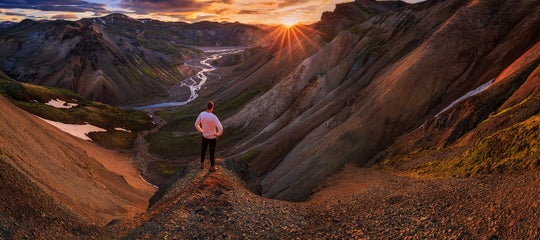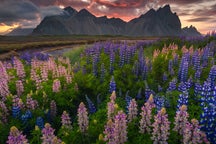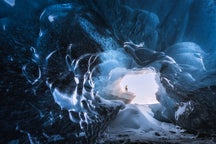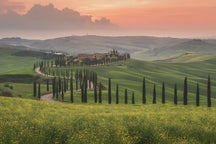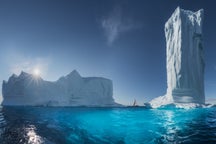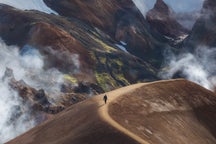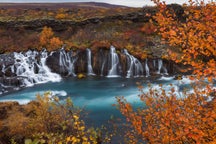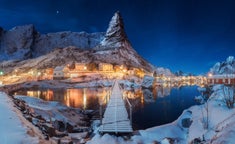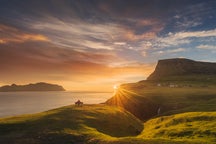
For some photographers, it can be very difficult to find something to photograph in their own backyard. David López García has challenged this notion time and again, capturing beautiful images from around his hometown in Asturias, Spain.
- Check out this Patagonia Summer Photography Tour in Torres del Paine
- Explore these articles on Landscape and Nature Photography
- Discover Where to Find Camera Manuals Online
His seascapes depict the wild and oftentimes dramatic atmosphere of the coast, invoking the raw power of nature. Through the careful use of light and shadow, he is able to breathe life into otherwise two-dimensional landscapes, with photographs that command attention from the human eye.
This week, we had the pleasure of chatting with David about the inspiration behind his work and the vision that drives his creativity. David also shared some valuable advice for photographers who might be struggling to find the motivation to continue shooting at this time.
 David López García is a travel and landscape photographer from the Asturias region in Spain. Photo by: 'David López García'.
David López García is a travel and landscape photographer from the Asturias region in Spain. Photo by: 'David López García'.
- See also: The Best Camera Bags for 2020
Hello David, thank you for joining us today! For those who are unfamiliar with your work, could you please give a bit of an introduction about who you are and how you came to be a professional landscape photographer?
Hello everyone and thank you very much for thinking of me for this interview, it's an honour.
My name is David and I'm from a small town on the Asturian coast in Spain. I work as a sports trainer in a local facility and in my spare time, I am an amateur landscape photographer.
Ever since I can remember, I have had a passion for travelling and visiting new places. It was because of this that I bought my first camera. Without any technical knowledge and with the frustration of not being able to get pictures of what those places conveyed to me, I decided to get rid of all the equipment and leave photography aside. It wasn't until early 2018 that I bought a small mirrorless camera. It was from then that I started to look at photography tutorials and began to go out on my first excursions exclusively for photography. Little by little, I got into my great passion of today.
 David has always had a passion for travelling and visiting new places. Photo by: 'David López García'.
David has always had a passion for travelling and visiting new places. Photo by: 'David López García'.
- See also: Travel Photography Explained
In your opinion, what are some of the characteristics that a landscape photographer should possess? How does this differ from other fields of photography?
I think a landscape photographer should be a person who enjoys adventure and loves being in touch with nature. Otherwise, it would not be possible to keep up with, since many times you have to get out of bed when others are sleeping or walk for hours and hours in search of a certain location. If you don't like this, then I think it is impossible for you to become a good landscape photographer.
On a technical level, I believe that a landscape photographer has to have a great capacity to adapt to the environment and the changing conditions they may encounter. This is something I am passionate about because even if you go back to a location you already know, you never know what conditions you will encounter.
 One of the qualities that a landscape photographer should possess is the love of being in touch with nature. Photo by: 'David López García'.
One of the qualities that a landscape photographer should possess is the love of being in touch with nature. Photo by: 'David López García'.
- See also: What is Landscape Photography?
What is your favourite combination of gear to use in-field? If you only had five minutes to prepare for an unknown assignment and you could only take three pieces of equipment with you, what would you take and why?
I would certainly say a wide angle lens and a good tripod. I can say that over 90% of the pictures I have taken have used these two pieces of equipment.
If I had to go to an unknown place and I could only take three pieces, I would take a tripod, my camera with a 16-35mm lens and a polarising filter, which I consider essential for seascapes and forest scenes due to the beautiful colours that can be achieved.
 A camera, wide angle lens, tripod and polarising filter are essential pieces of equipment to capture scenes like this. Photo by: 'David López García'.
A camera, wide angle lens, tripod and polarising filter are essential pieces of equipment to capture scenes like this. Photo by: 'David López García'.
You shoot a lot around the beautiful Asturias part of Spain and your seascapes show such dynamic motion. What is it about this area that captures your imagination? How do you translate that into your photography?
Thank you very much. I am proud that through my images, I am able to show the beauty of the place where I live. As you said, I can consider myself lucky to reside in one of the most beautiful fringes of the European coastline.
I've always lived near the sea and I believe that I couldn't live far from it – this is surely reflected in my photography. I love the dynamism and the strength that a wave can convey through an image and it's something that I always try to achieve in my photographs.
 The dynamic nature of the sea is something that David seeks to capture. Photo by: 'David López García'.
The dynamic nature of the sea is something that David seeks to capture. Photo by: 'David López García'.
- See also: Ultimate Guide to Seascape Photography
Do you have a certain subject matter or style that you find yourself being drawn to whenever you explore the environment around you for compositions?
Whenever I arrive at a new location, I try to find what the point of interest is that I want to show in my photography. Once done, that's when I start looking for compositions that I like. In coastal photography, I always try to analyse the behaviour of the waves and try to include them as a compositional element. I also love symmetry and I would say that it is something that I am almost obsessed by; in many of my photos, it is something that I try to achieve.
Your photographs have such extraordinary lighting and convey emotive atmospheres. What kind of planning goes into capturing these types of images and how do you utilise post-processing software to reach the final result? Can you share some of your techniques for photographing and editing landscapes?
It is true that most of my photographs are characterised by a dark atmosphere, in which the contrast between light and shadow areas creates an emotional atmosphere, as you said. To achieve this, I try to plan my trips so that the best lighting conditions coincide with the best tide conditions for each location. All this requires a knowledge of the area and the conditions that are best for each location.
At the time of shooting, I always sub-expose the images a lot. In the post processing phase, I try to use the light to emphasise the areas of the image that I consider to be of more interest, while keeping shadows in the areas that are less interesting. It's about guiding the viewer's eye through a play of light and shadows.
 Underexposing is characteristic of David's style. Photo by: 'David López García'.
Underexposing is characteristic of David's style. Photo by: 'David López García'.
What do you think is one of the biggest misconceptions about landscape photography and how would you like to change people’s mindsets in relation to it?
Without a doubt, one of the things that bothers me the most is when people don't appreciate the work behind a good landscape picture. Many times, I have heard that this type of photography does not require certain knowledge, just the luck of being in the right place at the right time.
Behind a great photo, there is a lot of planning work and a lot of technical knowledge that is needed to be able to take it. I think that in other places of the world, this is more valued than in Spain, where I live.
What is the take-home message that you want people to receive when they look at your work?
On a photographic level, I would like that when someone looks at my pictures, they can tell that my compositions are carefully taken and that I have treated the lights and shadows well. On the other hand, for me as I said before, it is a pride that people from other parts of the world can appreciate the beauty of my land.
 David seeks to expose the beauty of his homeland to people from all around the world. Photo by: 'David López García'.
David seeks to expose the beauty of his homeland to people from all around the world. Photo by: 'David López García'.
There is often a lot of tourism in some of the places that you visit for photography, even during the magical hours of sunrise and sunset. How do you plan your visits so as not to be disrupted by other people? Have you ever had any difficulties with people being caught up in the frame of your shots? How do you work around that?
Luckily, I have rarely encountered this problem, as the Asturian coast does not usually have these crowding problems. When I meet someone in the same place, I love to chat a while and enjoy the moment. However, it is true that in some locations, I have found myself with too many people around. When that happens, I try to find a different frame in which I don't get disturbed. I also have to say that in some occasions, I have had to clone people out in post processing!
A topic that is discussed quite often on social media these days is the impact of location-specific tourism upon nature, wildlife, culture and the environment. What is your take on this?
It's a shame that people who visit a place because of the beauty of its natural surroundings don't know how to respect it. Sometimes, I think that some places are better kept hidden in order to prevent this from happening.
 The interaction of humans with nature has always been contentious. Photo by: 'David López García'.
The interaction of humans with nature has always been contentious. Photo by: 'David López García'.
- See also: 25 Tips for Creative Beach Photography
What can people do to be more conscious and respectful when travelling to destinations around the world for photography?
In general, most of the people whom I meet in this area are people who respect the environment and nature; however, there are always people who do not behave in a civic way.
Perhaps the fault of some unpleasant situations is sometimes due to the lack of knowledge about the environment. Other times, it may be due to the competitive anxiety that social networks generate nowadays, where people try to find the best picture without caring about how.
What is something that you have learned about photography that you would like to communicate to people who are just starting out in the field?
A good piece of advice – which can be applied to any discipline of life – is that whatever you do in your life, do it with passion and without rushing. If you really love something, you will not have any problems investing time in it, nor will you have the need to reach your goals too soon. Practice a lot to improve your skills, observe in detail the work of other photographers who inspire you and discover what it is about their images that make this inspiration happen. I always try to keep learning and stay motivated.
 One piece of advice from David is to do everything with passion and without rush. Photo by: 'David López García'.
One piece of advice from David is to do everything with passion and without rush. Photo by: 'David López García'.
Do you have any advice for people who may currently be facing travel and other restrictions on their activities at the moment due to COVID-19? How can they stay motivated to shoot?
Some good advice would be to try to turn a bad situation into something positive. As a consequence of these restrictions, many photographers will not be able to make great trips or visit well-known places but we can try to improve our creativity by photographing our surroundings and getting out of our comfort zones.
Sometimes, we become obsessed with photographing epic places and neglect a little creative work. A good exercise can be to try to improve our compositions and get good shots in places that may not be so obvious. If we can do that, we will surely improve as photographers.
What is the next challenge that you have on your agenda? Are there any particular aspects of photography that you would like to experiment with in the next 12 months?
As a goal for this year, I have proposed to initiate myself into night photography, which was something that I had never practised until now. I am lucky that here, we also have beautiful mountain landscapes in which to be able to carry out this type of photography. I would also love to make a photography trip, for example to Iceland, which is one of those places that I dream about photographing.
 Aside from capturing seascapes, David is working on the foray into night photography. Photo by: 'David López García'.
Aside from capturing seascapes, David is working on the foray into night photography. Photo by: 'David López García'.
We hope to see you in Iceland someday! Thank you for sharing your thoughts with us in this interview. What are some final words that you’d like to leave with our readers?
I would like to thank you for considering me for this interview. It is an honour for me when I see the great photographers who have passed through here.
For more information on David López García's work, you can visit him at 500px and Instagram.
Learn how to capture the world around you with the masters of landscape photography. Check out our range of international photo tours and photography workshops.


